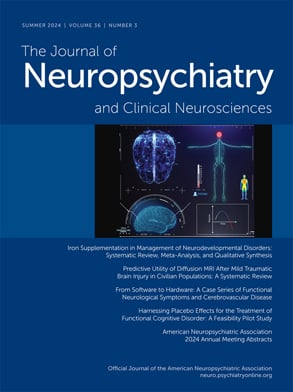SIR: Catatonia is generally considered to be a subtype of schizophrenia.
1 However, many other psychiatric as well as neurological illnesses can give rise to signs of catatonia.
1 Treatment of agitated behavior as observed in catatonia presents a therapeutic dilemma. We report the response to clozapine in a patient with organic catatonia following severe frontal lobe injury.
Case Report
A 56-year-old native Portuguese woman was involved in a major motor vehicle accident and sustained jaw fractures as well as a left frontal epidural hematoma. Because CT scans demonstrated an increasing bifrontal hygroma, frontal burr holes were administered, and later a frontal subduroperitoneal shunt system was implanted.
At the time of referral to our department for early rehabilitation 4 weeks after trauma, the patient was awake but confused. She was able to obey commands, but after a few minutes she became restless and displayed rhythmic repetitive movements of her arms and a rocking motion of the trunk. She then repeatedly screamed, repeated the last words of questions asked, and stereotypically counted a sequence of numbers in Portuguese. She could move her limbs voluntarily, but her knees and elbows were in a flexed position due to high flexor muscle tone.
The patient did not respond to neuroleptic agents such as phenothiazine, and haloperidol decanoate caused severe parkinsonian symptoms, even in minor dosages. Lorazepam resulted in diminished stereotypic movements for only a few days. Therefore, clozapine therapy was commenced and gradually increased to 350 mg a day.
The catatonic symptoms slowly began to resolve, and periods when the patient was oriented and showed only minor motor abnormalities became increasingly longer. With daily physiotherapy, the patient was able to walk and could write a letter in Portuguese.
Two months after catatonic symptoms had resolved, clozapine was discontinued and carbamazepine was started. Two days after discontinuation, stereotypic movements and severe restlessness reappeared. When the patient was asked to write down some words, she could write only repeated syllables, and once she had started, she could not stop writing. Clozapine therapy was resumed, and stereotypic movements resolved within a few days. One year after the trauma, clozapine dosage was gradually decreased without a relapse of catatonic symptoms. Neuropsychological testing demonstrated a prefrontal syndrome with cognitive impersistence, emotional lability, and diminished spontaneity.
Discussion
In this patient, a disinhibited prefrontal syndrome could be observed presenting as organic catatonia with stereotypic movements, iterations, and verbigerations, as well as muscle rigidity. Neuroleptic agents such as haloperidol were inefficacious and produced major side effects. Clozapine was therefore administered and facilitated a marked improvement of catatonic symptoms.
Clozapine is an atypical antipsychotic drug that has demonstrated efficacy in patients with treatment-resistant schizophrenia. Several authors have reported that clozapine may also be useful in patients with disinhibition secondary to neurological disorders.
2,3 Recurrence of psychotic symptoms after discontinuation of clozapine, as observed in our patient, has been previously described.
4,5 Because clozapine has a very short half-life, it has been suggested
5 that withdrawal can result in a fairly rapid cessation of antipsychotic activity and recurrence of psychotic or catatonic symptoms.
Clozapine may be useful in patients with organic catatonia following orbitofrontal lesions. However, major side effects such as agranulocytosis or dose-related seizures must be taken into account, and the risk of sudden recurrence of symptoms after discontinuation of clozapine should also be considered.

